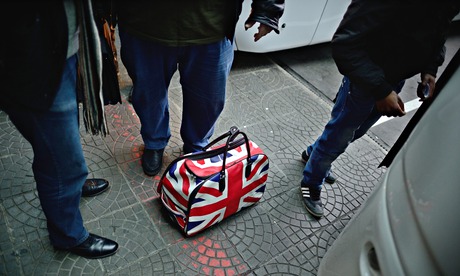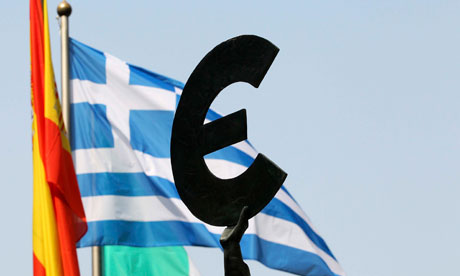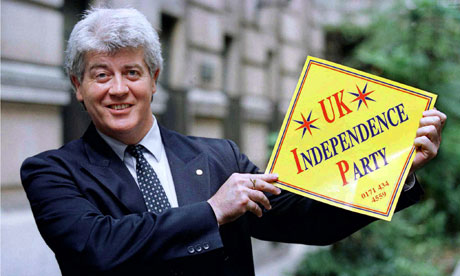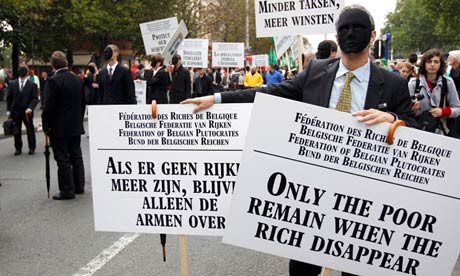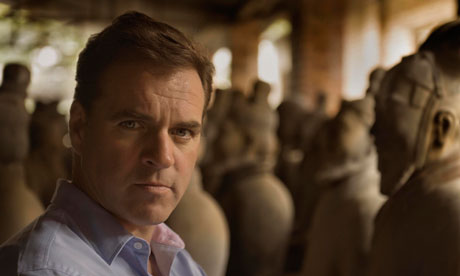The anti-immigration election rhetoric is perverse – we fear the arrival of people that we have drawn here with the wealth we stole from them

‘Let’s not forget where coffee and tea come from: this mug is bitterly opposed to its own contents’
I sometimes wonder if satire has reached a nadir in Britain because British society has itself become a parody of itself. The Chipping Norton Set: the prime minister, a tabloid editor and a Roger Mellie-ish TV icon all conveniently living in the same little town and taking turns at being the centre of scandal, feels like a novel Martin Amis bashed out because his conservatory was leaking. Likewise there has been an element of tragic irony this week as the growing drumbeat of anti-immigration election rhetoric has been punctuated by the mass drowning of migrants.
The SNP’s growing popularity has prompted a little low-level press racism of the kilts-and-porridge variety, as an English electorate struggles with the idea that there will be Scottish people holding the reins of power for the first time since the last government. Nicola Sturgeon has been called “the most dangerous woman in Britain”, by someone who hasn’t met any other Scottish women. Of course, it’s difficult to explain to English people that we have always had their best interests at heart – if we hadn’t invented penicillin they would have all died in a Greek airport departure lounge. There have already been a couple of amusing moments in the campaign when leaders standing in front of union jacks expounding on the need for a £100bn missile system have taken time out to warn us about the dangers of nationalism. Personally, I think it might be invigorating to have a hung parliament where, before any law was passed, the government had to have an argument with a Scottish person.
“Gosh, you seem awfully good at this. Have you had some practice?”
“I’m not actually part of the Scottish negotiating team, I’m just here to take your drinks order …”
“Ah, right, could I have a cup of tea?”
“NO.”
Ed Miliband’s anti-immigration stance is odd: it’s hard to vote for a man who doesn’t have the confidence to defend his own existence. It seems that his main argument against immigrants is that his dad raised a befuddled fuckwit. Could you hand Labour’s “controls on immigration” mug to a guest? There’s nothing like jollying up a Macmillan Cancer Support coffee morning by making your neighbours feel like the pakoras were a little unwelcome. Let’s not forget where coffee and tea come from: this mug is bitterly opposed to its own contents. Unless you drink hot Tizer from a coffee cup, the drink inside that mug will be an immigrant. The logic of a receptacle for hot beverages provided by slavery and colonisation being anti-immigrant bears no more examination than a pair of homophobic Speedos.
Then there’s Ukip, like someone made a heavy-handed version of The Thick of It for ITV. They don’t want Britain to be ruled by foreigners – with the notable exception of the royal family. They want an Australian-style points system for immigration. Who knows what this will look like, but my suspicion is “being white” will be like catching the snitch in Quidditch. If we have become a self-satirising society, Ukip are just the broader end, the easy slapstick laughs. They even have a porn-star candidate. Of course, he isn’t the first MP to have filmed himself having sex. But he is the first to do so with an adult, whom he allowed to live.
Even our charity is essentially patronising. Give a man a fish and he can eat for a day. Give him a fishing rod and he can feed himself. Alternatively, don’t poison the fishing waters, abduct his great-grandparents into slavery, then turn up 400 years later on your gap year talking a lot of shite about fish.
In a further nod to satire, Comic Relief this year focused on Malawi and Uganda. I didn’t see any acknowledgement that Britain had been the colonial power in those countries. “Thanks for the gold, lads, thanks for the diamonds. We had a whip-round and got you a fishing rod.”
A lot of racism comes from projection. White Americans have a stereotype of black people being criminals purely because they can’t acknowledge that it was actually white people that stole them from Africa in the first place. Today, you have the spectacle of black men being gunned down by cops who, by way of mitigation, release footage to show that the victims were running away. This is what happens when you don’t understand or even acknowledge history. You end up in a situation where, when slavery is the elephant in the room in your relationship with African Americans, you think it’s OK to say that you killed one of them because he was trying to escape.
Britain is in a similar place with colonialism. We have streets named after slave owners. We profited from a vile crime and feel no shame. We fear the arrival of immigrants that we have drawn here with the wealth we stole from them. For much of the rest of the world we must be the focus of bitter amusement, characters in a satire we don’t understand. It is British people that don’t learn languages, or British history. Britain is the true scrounger, the true criminal.

